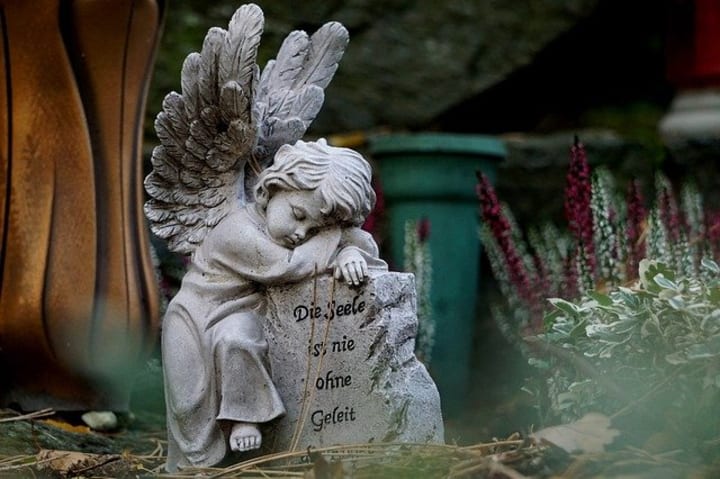GRIEF
The Emotional Turmoil of Grief & Loss

Grief is something that none of us can avoid, whether it is grief of a loved one that has died or whether it is the grief of a mother whose children have flown the nest. We can also experience grief at the loss of a loved career or loss of health and vitality. Whatever that grief, all of us will face it during our lifetimes, especially loss of our loved ones. Grief is probably the most devastating of life trials, that we all face and many of us face it several times during our lives.
The grief and depth of emotions that encompass us may be less or more, dependent on the relationship of the person or the situation lost. Unfortunately, grief is something that is not encouraged in our society and many people grieve alone. Many people fear grief and want someone who is bitterly grieving to ‘get over it,’ as soon as possible. Some people will try to jolly the person out of it or give practical support, like cleaning the house or getting the shopping in. Other people may avoid the grieving person altogether. This can result in the person who is grieving, feeling very alone and abandoned.

Grief itself encompasses so many conflicting emotions all at once, that it can feel as if we are drowning in it. The pain may be felt physically as well as emotionally. If we allow ourselves to feel the pain and grief, we will find some relief in crying and sobbing. However, many of us avoid the pain and try to soldier on, but really we are trying to run away from the reality of the grief. This can lead to serious consequences with our mental and physical health, if we leave it festering and don’t allow ourselves to feel all those heart wrenching, emotions. Avoidance can lead to depression, anxiety, panic attacks and even a mental breakdown. It can even lead us towards ill health and reduce our immunity to colds, flu and other viruses.
When we allow ourselves to grieve, we will feel intense emotions. Sometimes we might blame others, like the doctor or the hospital staff or our religious and spiritual leaders. We might feel extreme periods of anger, towards others, ourselves and towards the person for whom we are grieving. The latter can leave us feeling ashamed and guilty.

Sometimes we try to bargain for a few more precious moments with our loved ones, no matter how impossible that might seem. I remember when I lost my son, feeling like my whole world had crashed around me. It was horrifying to realise that there would never be a door, anywhere in the world, that would open to find my son on the other side. This was something that I just couldn’t get my head around. How could such a creative and charismatic person, as my son was, be gone? How could his huge energy be extinguished so completely?
Realising that our loved one has gone and everything that they were, has disappeared with them, leaves a terrible hole in our lives. It is very hard to come to terms with the fact that our loved one has gone. It seems to be such a hard concept to accept. One minute they were in our lives and talking, walking (unless very ill), going about their day, calling you on the phone and the next minute, they have disappeared entirely. It can feel totally overwhelming that they are no longer with us and we struggle to believe they have really gone.

You might experience times when you see someone and you feel a rise of joy and tears when, in a split second, they look like the person you have lost. A second later, you realise they are not them at all and you feel choked with grief again. You might even experience a sinking feeling physically, like a stone in your stomach area or you might experience palpitations or nausea.
Grieving can take many forms and can happen in fits and starts. You might feel okay one moment and in floods of tears the next. Everything around you seems to remind you of them. Sometimes you go over and over your last precious moments with them. At other times, you might berate yourself continuously, for the things you wish you had done and said, whilst they were still alive. I want you to know this is normal.
It is distressing enough that you have lost a loved one, but when grief hits you, many people will avoid talking to you about it, which can exacerbate your distress. After the condolences stage, which quite frankly, when I had first lost my son, I wanted to strangle people for. Everyone just seemed to be carrying on as normal. You might experience intense moments of anger that the sun has the temerity to shine or that people can be talking and laughing.

When the funeral is over, although you feel like you are in a million pieces, everyone else seems to be going about their normal daily routines, as if nothing has happened. You might find family and friends avoid bringing the subject up, so that it feels like no-one else gives a damn, which can add to your feelings of anguish. Conversely, sometimes people will tell stories about your loved ones antics, when they were alive, which can be lovely but can also increase your feelings of loss.
It can also be annoying if it goes on and on. Some days you might want it to rain and storm to echo how you feel inside. There are days when you might curse the fact that you are still alive. If the relationship was a close one, you might experience feeling very low in mood and you might question the point of life. You may even experience suicidal thoughts at times. This may be driven by an overwhelming desire to still be with your loved one. If the suicidal thoughts become more intense and you develop plans about suicide, you need to seek counselling or seek help from your GP. This may also lead to a referral to your local mental health team.
I need to let you know that everyone is different and deals with these emotions in their own unique way, however, I urge you to allow yourself to grieve. Not for six weeks or three months, or however long is publicly acceptable, but for as long as it takes.

There can be times, later on, where you might smile or even laugh and then feel awful inside, that you can feel that way when someone so precious has died. At other times, memories flood your mind. You remember your loved one and a specific scene might make you laugh or smile and then you burst into tears, as you recognise you will never experience this with them again.
Sometimes, later on in the grieving process, it can feel as if we dreamed them up. This is truly horrible. When they have been gone for a long time, you start to doubt yourself, even though all your memories tell a different story.
It is a rollercoaster, my friend, and one that is not easily navigated. My best advice is not to avoid these intense feelings. Allow yourself to feel them and express them, even if you have no-one to express them to. Talk out loud to yourself, the dog, the cat, or talk to your loved one, as if they were able to answer you. Or write your feelings down.
Whatever you do, keep going.
Shout at the wind and rain, scream, cry, sob, rock yourself to sleep or rock yourself whilst you’re sitting. Over time, the crying and sobbing will feel like it is cleansing, even though it is exhausting.
When you feel angry, allow yourself to express that anger safely, shout out loud, hammer the pillow or cushions with your fists, paint your anger, painting huge letters or words in red or black is useful. During the early days of my sons’ death, I used to go for a drive and shout at the world, the gods, the reapers of such injustice. I probably looked insane to anyone that noticed but it helped.

Walk out in nature. Allow yourself to sit in nature, under a tree or by a stream. This helps to ground you and to give you some sense of peace in the madness of it all. There is only one way to go with this and that is through the grief, however long that takes.
You might have times when you feel less grief stricken and may even laugh with someone and then feel really guilty as a result. You might even have periods where the grief seems to be abating and then a day or a week or even a month later, you find yourself in floods of tears or angry at the world. This is all part of it.
Allow yourself to feel these emotions as they come and be aware of what you need at these times. If you need to rest, then rest. If you need company, talk to a friend or family member. You might find relief in a walk.

There is no one size fits all and no one can tell you exactly how long it will take. Just know that if you allow yourself to go through these feelings as they come up, allowing yourself to feel them and express them, you will start to feel some relief.
Whether you express your feelings with tears or talking out loud or rocking yourself or curling up with a blanket, know that one day, you will start to move out of the grief, in stages. You will get to the point where you can smile without guilt, look at a picture of your loved one and cherish the memory, listen to music and learn to live again. Again, this can be in fits and starts.
When I lost my son, I couldn’t listen to music for four years, but during that time, I was able to talk about him with my other children and my friends. Please be kind to yourself, allow yourself the time and space to do this. Don’t listen to other people that tell you that you should be over it by now. This is your journey, your grief. There is no time limit.
Sometimes, we don’t get ‘over’ it but we learn to live with the loss.

About the Creator
Kaarina Vanderkamp
I am a freelance writer for hire, writing on matters of health, mental health, herbal medicine and wellbeing. I love writing and creativity. I am a Medical Herbalist, Psychiatric Nurse, Writer and artist.






Comments
There are no comments for this story
Be the first to respond and start the conversation.